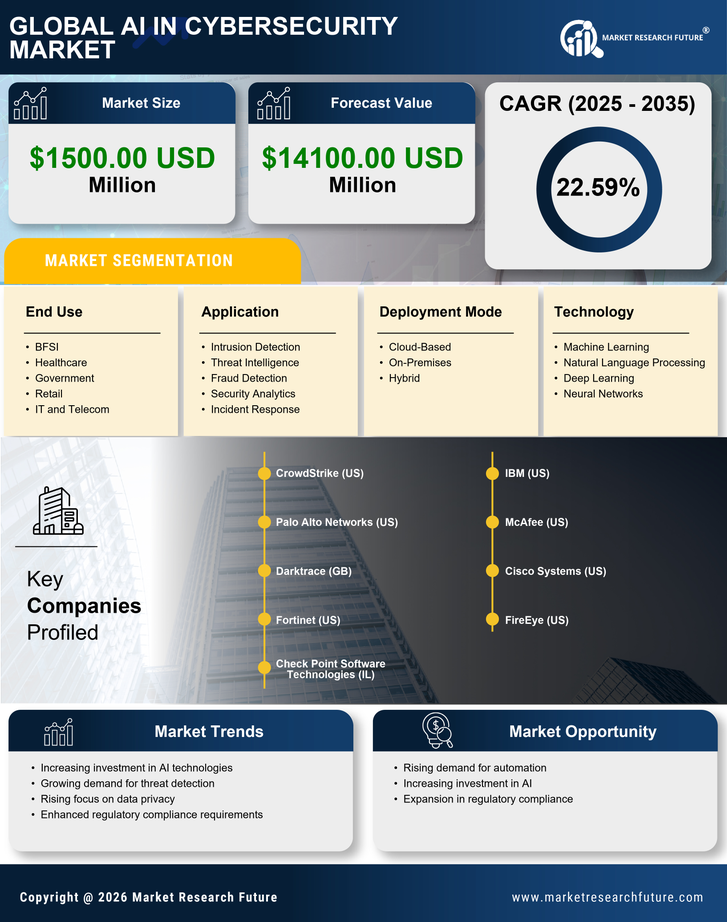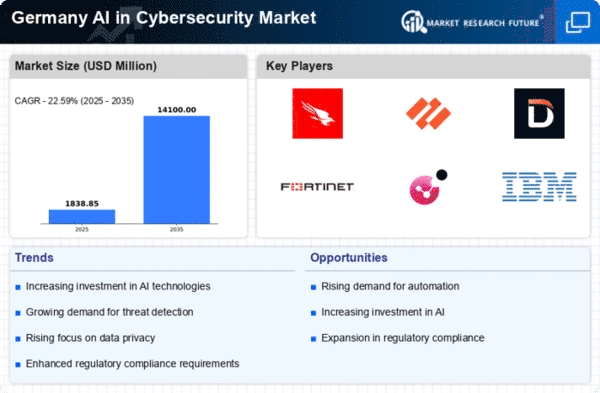The ai in-cybersecurity market in Germany is characterized by a dynamic competitive landscape, driven by the increasing sophistication of cyber threats and the growing demand for advanced security solutions. Major players such as CrowdStrike (US), Palo Alto Networks (US), and Darktrace (GB) are at the forefront, leveraging innovative technologies and strategic partnerships to enhance their market positions. CrowdStrike (US) focuses on cloud-native solutions, emphasizing rapid deployment and scalability, while Palo Alto Networks (US) invests heavily in AI-driven threat detection and response capabilities. Darktrace (GB), known for its self-learning AI technology, positions itself as a leader in autonomous response, which is increasingly appealing to organizations seeking to mitigate risks in real-time. Collectively, these strategies contribute to a competitive environment that is both collaborative and adversarial, as companies seek to differentiate themselves through technological advancements and customer-centric solutions.
Key business tactics within this market include localized service offerings and supply chain optimization, which are essential for addressing the unique regulatory and operational challenges in Germany. The market structure appears moderately fragmented, with a mix of established players and emerging startups. This fragmentation allows for diverse approaches to cybersecurity, fostering innovation while also intensifying competition among key players. The collective influence of these companies shapes the market dynamics, as they vie for market share and customer loyalty through differentiated service offerings and technological prowess.
In October 2025, CrowdStrike (US) announced a strategic partnership with a leading German telecommunications provider to enhance its threat intelligence capabilities. This collaboration is expected to bolster CrowdStrike's presence in the European market, allowing for improved service delivery and localized threat detection. The strategic importance of this partnership lies in its potential to leverage the telecommunications provider's extensive network infrastructure, thereby enhancing the efficacy of CrowdStrike's AI-driven solutions in real-time threat mitigation.
In September 2025, Palo Alto Networks (US) launched a new AI-powered security platform tailored specifically for the European market, which integrates advanced machine learning algorithms to predict and prevent cyber threats. This move signifies Palo Alto's commitment to innovation and its understanding of the unique cybersecurity landscape in Germany. By focusing on predictive analytics, the company aims to provide organizations with proactive security measures, thereby enhancing their overall resilience against cyber threats.
In August 2025, Darktrace (GB) expanded its operations in Germany by opening a new research and development center in Berlin, aimed at advancing its AI technology for cybersecurity. This strategic expansion underscores Darktrace's dedication to innovation and its intent to tap into Germany's rich talent pool in AI and cybersecurity. The establishment of this center is likely to enhance Darktrace's capabilities in developing cutting-edge solutions that address the evolving threat landscape.
As of November 2025, current competitive trends in the ai in-cybersecurity market are heavily influenced by digitalization, sustainability, and the integration of AI technologies. Strategic alliances are increasingly shaping the landscape, as companies recognize the value of collaboration in enhancing their service offerings and technological capabilities. Looking ahead, competitive differentiation is expected to evolve, with a notable shift from price-based competition to a focus on innovation, technology, and supply chain reliability. This transition may redefine how companies position themselves in the market, emphasizing the importance of advanced solutions and strategic partnerships in achieving long-term success.

















